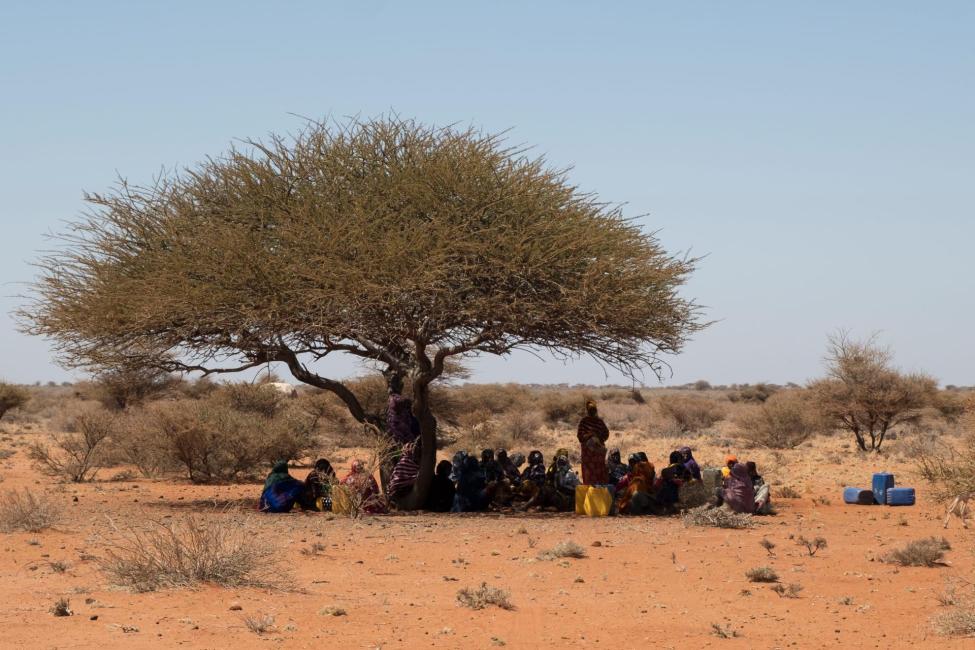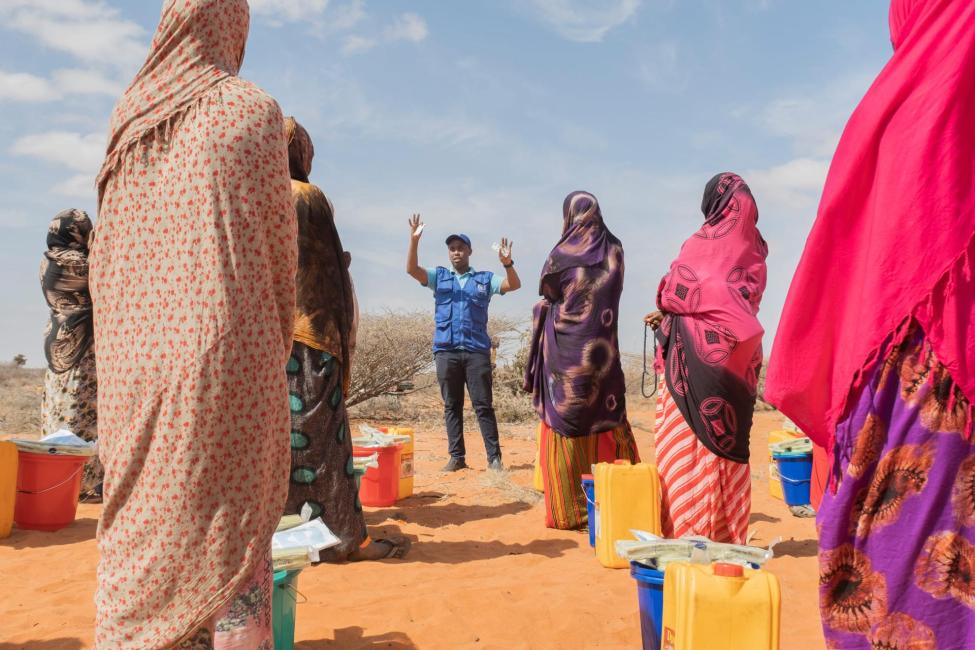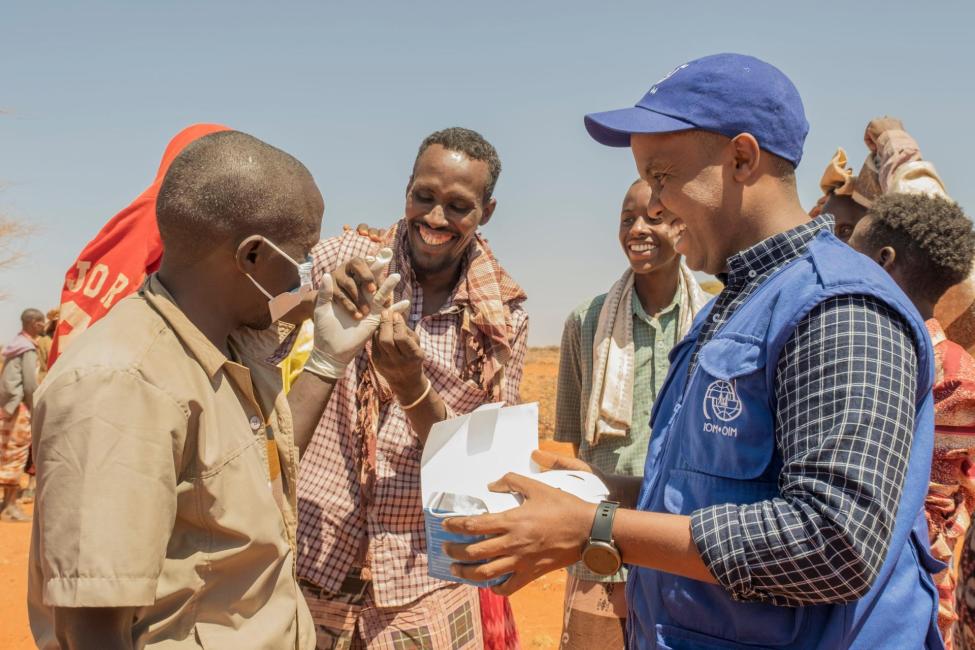-
Who We Are
WHO WE AREThe International Organization for Migration (IOM) is part of the United Nations System as the leading inter-governmental organization promoting since 1951 humane and orderly migration for the benefit of all, with 175 member states and a presence in over 100 countries. IOM has had a presence in Somalia since 2006.
About
About
IOM Global
IOM Global
-
OUR WORK
Our WorkAs the leading inter-governmental organization promoting since 1951 humane and orderly migration, IOM plays a key role to support the achievement of the 2030 Agenda through different areas of intervention that connect both humanitarian assistance and sustainable development. Across Somalia, IOM facilitates transition of Internally Displaced Persons (IDPs) and refugees towards durable solutions by providing services and support for Migrants and Mobile Populations.
Cross-cutting (Global)
Cross-cutting (Global)
- Data and Resources
- Take Action
- 2030 Agenda
The worst drought in decades is ravaging the Horn of Africa, with Somalia being the hardest hit following three consecutive failed rainy seasons.
Thousands of rural and pastoralist communities whose survival depends on natural resources face extreme hunger as boreholes and shallow wells are drying up across the country.
The severity of the drought is also driving widespread displacement and triggering conflict between communities. Over 700,000 have been forced from their homes in search of food, water and pasture for their animals, adding to the 2.9 million who were already internally displaced inside the country.
These are the stories of some communities affected by the drought in Galmudug, a state in central Somalia where the adverse impacts of climate change are contributing to increased displacement and the risk of violent conflict.
Access to clean and safe water is a growing issue for nomadic communities in Galmudug who have traditionally depended on rain to provide for themselves and for their animals.
Recurrent droughts and floods are causing the erosion of traditional grazing land, making it harder for nomadic communities to sustain their livestock. The lack of natural resources is forcing them to move from rural areas to urban centres to seek humanitarian assistance.
“The smell of these dead animals may bother you, but for me, it is different. I have been raising these goats for some time, but as you can see, worms are eating them in front of me,” says Ahmed, a nomadic herder from Galmudug who lost 60 of his goats due to the severe drought.
It is not the first time for Ahmed to suffer from a period of drought. In 2011 and 2017, Somalia experienced two extreme drought crises. Experts warn water scarcity is the most severe in the last 40 years. Ahmed and his children are seeing it unfold in front of them. “We haven't had a drought like this in years. I almost lost my mind because it's something I can't do anything about.”
The recurrent nature of climatic shocks in Somalia, such as droughts and floods and most recently the locust invasion, means pastoralist communities have no time to recover.
Water sources have little or no water left in most villages. This water well located between Hurshe and Hog-Dugaag villages used to supply water for about 300 people, including pastoralists and their livestock. A lack of rain in the area for months has caused its reserves to dry up.
The International Organization for Migration (IOM) is ramping up its response to reach over 255,000 people with clean and safe water by the end of March 2022. Water trucking, distribution of hygiene kits, and construction and rehabilitation of boreholes and shallow wells are underway across 103 locations in Gedo, Galmudug, Lower Shabelle, and Lower Juba regions.
In Galmudug, families received 90 liters of water daily for four weeks between January and February 2022, thanks to water trucking activities organized by IOM.
Abdi raises camels near the village of Sadex-Higlo in the Mudug region of Somalia. Camels are a lifeline for many nomadic families who depend almost entirely on their milk and meat to withstand dry periods.
“These camels are my only hope in this life. If the land dries up because of the drought, I have to feed them like my children until God’s help comes,” says Abdi as their camels drink from a borehole rehabilitated by IOM. Abdi added porridge to the water so that the camels could also get the nutrients they needed.
Camels can go long periods without drinking water and endure difficult environmental conditions like those found in Somalia. The current drought is also threatening the lives of these animals, risking the livelihoods of thousands of pastoralist and rural communities. IOM constructed a small berkad – a traditional water reservoir that is often privately owned – to provide water to communities in the village of Sadex Higlo and its surroundings.
When rain is scarce, rural communities have no other option than to organize for a water truck to come to their area from major cities or to buy water from berkads – a traditional water reservoir that is often privately owned. Families can spend around six USD per day for a six-person household in areas where daily incomes are less than two USD.
During long periods of drought, there is an increase of disease due to a lack of hygiene and the widespread death of animals. IOM distributed hygiene kits to 4,500 households in Galmudug. The kits included jerrycans, soap, water purification tablets, buckets and sanitary pads for women.
IOM explains to communities how to use personal protective equipment to avoid infectious diseases like measles or COVID-19.
IOM is providing clean and safe water to rural communities living in the remote valley of Qaloocan. The 60km square valley is home to hundreds of nomadic families.
“You can’t feel the sweet taste of the water, unless you suffer from the big disaster we are facing now. There is no greater joy than knowing my family will have enough water to drink today. I can't wait for the bag to be full,” says Alas Abdi, 67. His family was among those benefiting from IOM´s emergency water activities in the remote valley of Qaloocan.
As the drought worsens, IOM is appealing for more funds to expand its life-saving assistance. Immediate action is critical to prevent a humanitarian disaster in the coming months.
IOM´s emergency activities to respond to needs arising from the current drought are possible thanks to generous funding from the UK´s Foreign, Commonwealth & Development Office (FCDO), the Central Emergency Response Fund (CERF), and the European Union.













